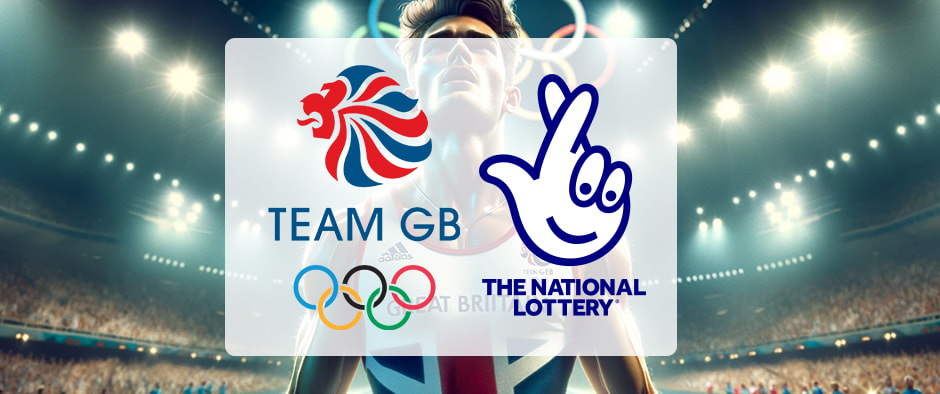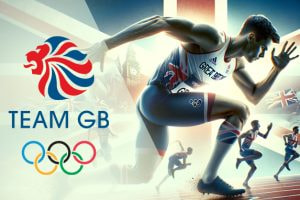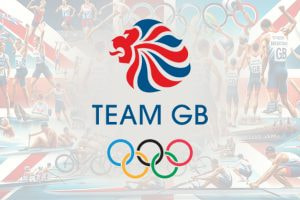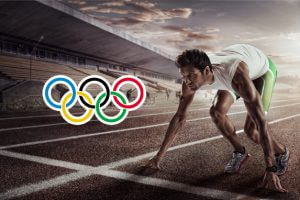John Major’s Legacy: National Lottery Funding Fuels Team GB’s Olympic Achievements
Fuelled by the National Lottery’s generous funding, UK athletics has undergone a remarkable transformation, achieving global recognition and numerous Olympic medals. This funding surge has been pivotal to nurturing the nation’s top athletes.

The National Lottery’s Impact on UK Athletics
The launch of the National Lottery by John Major in 1994 marked a pivotal turn in the fortunes of Team GB, setting the stage for a radical transformation in British athletics.
This funding mechanism was designed to channel proceeds into various sectors, including sports, with a significant emphasis on enhancing the UK’s athletic capabilities.
Before establishing the National Lottery, British athletes struggled globally, often outperforming competitors from nations with better-funded sports programs. Therefore, it wasn’t much of a surprise that few punters backed homegrown talent when betting on the Olympics.
The 1996 Atlanta Olympics, where Team GB secured only one gold medal, underscored the urgent need for greater investment in sports.
With the infusion of National Lottery funding, UK Sport was able to implement strategic programs that targeted areas most in need of support. This included the development of state-of-the-art training facilities, access to top-tier coaching, and comprehensive support services for athletes.
The impact of these investments became visible as early as the Sydney 2000 Olympics, where Team GB’s medal haul increased significantly. This upward trajectory continued through successive Olympic Games, with the team achieving remarkable success in London 2012 and Rio 2016, finishing third and second in the medal tables, respectively.
The funding not only bolstered infrastructure and training but also facilitated grassroots programs to identify and nurture future talent. This holistic approach has developed a sustainable pipeline of athletes equipped to compete at the highest levels.
Furthermore, the visibility of Olympic success catalysed a surge in public interest and participation in various sports. This cultural shift has broadened the UK athletic talent base, further feeding into the cycle of success initiated by National Lottery funding.
Today, Team GB is a testament to how targeted funding and strategic planning can elevate a nation’s athletic performance on the world stage. The ongoing support from the National Lottery continues to be a cornerstone of this success, ensuring that British athletes remain competitive and continue to excel.
The Turnaround: Team GB Before and After National Lottery Funding
The 1996 Atlanta Olympics served as a wake-up call for British sports, where Team GB’s performance highlighted the dire need for enhanced support and funding.
Securing only one gold medal and a total of 15 medals, the UK ranked a disappointing 36th overall.
| Olympic Medal Count | ||||
|---|---|---|---|---|
| Rank | Nation | Gold | Silver | Bronze |
| 1 | United States | 44 | 32 | 25 |
| 2 | Russia | 26 | 21 | 16 |
| 3 | Germany | 20 | 18 | 27 |
| 4 | China | 16 | 22 | 12 |
| 5 | France | 15 | 7 | 15 |
| 6 | Italy | 13 | 10 | 12 |
| 7 | Australia | 9 | 9 | 23 |
| 8 | Cuba | 9 | 8 | 8 |
| 9 | Ukraine | 9 | 2 | 12 |
| 10 | South Korea | 7 | 15 | 5 |
| — Rankings 11-35 not shown — | ||||
| 36 | Great Britain | 1 | 8 | 6 |
| 37 | Belarus | 1 | 6 | 8 |
| 38 | Kenya | 1 | 4 | 3 |
| 39 | Jamaica | 1 | 3 | 2 |
| 40 | Finland | 1 | 2 | 1 |
The turning point came with the introduction of the National Lottery funding, which aimed to enhance the support structure for British athletes radically. This strategic move was orchestrated with the vision of revamping the UK’s approach to Olympic preparation and talent nurturing.
By the Sydney 2000 Olympics, the effects of increased funding were beginning to show.
Team GB improved their medal tally significantly, winning 11 golds, ten silvers, and seven bronzes, moving up to 10th place in the overall medal standings—a remarkable leap from their previous standing.
The momentum continued to build with each subsequent Olympic Games. At the 2004 Athens Olympics, Team GB secured nine gold medals among their 30 medals, demonstrating consistent improvement and a solidifying sports infrastructure.
The real testament to the effectiveness of the National Lottery’s impact was the London 2012 Olympics. As hosts, Team GB showcased exceptional hospitality and an unprecedented athletic performance, securing 3rd place with 29 golds and a total of 65 medals.
Our next Team GB star spotlight is Jessica Ennis-Hill winning Gold in the heptathlon at London 2012. (Bonus points if you can name all seven events!)
Since then, she has competed in both the 2015 World Championships in Beijing and the Rio 2016 Olympic Games. pic.twitter.com/7yUnOyt9sd
— Madame Tussauds London (@MadameTussauds) August 9, 2022
This upward trajectory was sustained at the 2016 Rio de Janeiro Olympics, where Team GB became the first nation to surpass the medal count of a previous home Games. They secured 27 golds and a total of 67 medals, finishing 2nd in the medal table, which was a historic achievement.
| 2016 Summer Olympics Medal Table | ||||
|---|---|---|---|---|
| Rank | NOC | Gold | Silver | Bronze |
| 1 | United States | 46 | 37 | 38 |
| 2 | Great Britain | 27 | 23 | 17 |
| 3 | China | 26 | 18 | 26 |
| 4 | Russia | 19 | 17 | 20 |
| 5 | Germany | 17 | 10 | 15 |
| 6 | Japan | 12 | 8 | 21 |
| 7 | France | 10 | 18 | 14 |
| 8 | South Korea | 9 | 3 | 9 |
| 9 | Italy | 8 | 12 | 8 |
| 10 | Australia | 8 | 11 | 10 |
These improvements underscore the transformative impact of sustained financial investment in athletics. Team GB’s evolution from underperformers to Olympic leaders demonstrates the critical role of funding in achieving sports excellence on the world stage.
Key Investments and Their Impact on Athletes
National Lottery funding has been instrumental in transforming the landscape of British athletics, with substantial investments made into training, facilities, and athlete development programs. These investments have been carefully targeted to maximise the potential of athletes across various disciplines.
Significant funding has been directed towards building and upgrading state-of-the-art training facilities across the UK. These facilities offer athletes access to high-quality training environments equipped with the latest technology and equipment, essential for high-performance training in sports ranging from track and field to swimming and cycling.
In a world where sport seems to have completely sold itself out for money (World Cup in December anyone?) the heart and team spirit shown by the British Athletics team is uplifting. Shame they have to beg for lottery grants and government funding to go out and strike gold #TeamGB pic.twitter.com/uGs4CeyNSJ
— Donna Hindley (@MsDHindley) August 20, 2022
Athlete development programs have also received a boost, focusing on nurturing young talent and providing them with the resources necessary to develop their skills. These programs include coaching, nutritional advice, medical support, and psychological services, ensuring a well-rounded approach to athlete development.
Moreover, the funding has enabled the implementation of advanced sports science and technology in training regimens. This includes biomechanics analysis, performance data tracking, and injury prevention strategies, which are critical for enhancing athletic performance and prolonging careers.
The strategic allocation of National Lottery funds has not only improved physical training facilities but also enriched the support system around athletes, allowing them to train effectively and compete at the highest levels internationally.
Case Studies: Athletes Benefited from Lottery Funding
The influence of National Lottery funding on British athletics can be clearly observed through the extraordinary careers of athletes such as Adam Peaty, Laura Kenny, and Mo Farah. Each of these individuals has benefited immensely from enhanced training facilities and support systems, helping them reach their respective sports’ pinnacle.
Adam George Peaty OBE, born in 1994, is a defining figure in swimming, specialising in breaststroke. Peaty’s career took off with a historic win at the 2016 Summer Olympics, where he claimed the gold in the 100-metre breaststroke—the first British male to do so in 24 years. He continued his dominance by retaining this title in the 2020 Summer Olympics, becoming the first British swimmer to defend an Olympic title. An eight-time World Champion and holder of the world records in both 50 and 100-metre breaststroke, Peaty’s achievements are supported by his access to world-class training facilities funded by the National Lottery.
🏊♂️@adam_peaty – ‘I couldn’t become Olympic champion without funding’
➖3x Olympic🥇says more should be done to help lower-income families gain access to funding for high-performance sport. pic.twitter.com/7X1ReB6e6j
— Politics.co.uk (@Politics_co_uk) November 30, 2021
Dame Laura Rebecca Kenny DBE, born in 1992, has become the most decorated British female athlete in Olympic history, with successes spanning track and road cycling. Kenny’s achievements include six Olympic medals and multiple World, European, and Commonwealth titles. Her career benefited significantly from the top-tier velodromes and comprehensive coaching funded by the National Lottery, which played a crucial role in her victories at the 2012 and 2016 Olympics and most recently at the 2020 Olympics.
Laura Kenny is a HISTORY MAKER! 🥇
The first British woman to win gold at three different Olympic Games.
And she did it in some style!#Tokyo2020 #bbcolympics
— BBC Sport (@BBCSport) August 6, 2021
Sir Mohamed Muktar Jama Farah CBE, born in 1983, is one of the greatest long-distance runners ever. A Somali-born British athlete, Farah’s illustrious career includes ten global championship gold medals, marking him as the most successful British track athlete in modern Olympic Games history. His remarkable ‘double-double’ victories in the 5,000 m and 10,000 m at consecutive Olympics (2012 and 2016) were underpinned by the National Lottery-funded programs that provided him with access to elite training and sports science resources.
Mo Farrah almost fell again on the final lap! But he has qualified from his 5000m heat. #Rio2016 #Olympics pic.twitter.com/8ZyYueX6cx
— AutographItNow (@AutographItNow) August 17, 2016
These athletes exemplify the transformative effect of targeted funding on sports careers. The National Lottery’s support has elevated individual athletes and significantly boosted the UK’s standing in global athletics, making it a powerhouse in various sports disciplines. All three athletes profiled have acknowledged the vital support that funding from the National Lottery provided.
The Future of Team GB and Continuing Benefits of Lottery Support
The National Lottery’s investment in Team GB has not only reshaped the past and present of British sports but also promises significant benefits for the future. As the landscape of international athletics evolves, continuous funding ensures that Team GB remains at the forefront of this competitive arena.
Ongoing National Lottery support is crucial in maintaining and expanding the infrastructure that has fostered British athletic success. This includes further development of training facilities, support for emerging sports technologies, and programs that identify and nurture new talent. Such sustained investment ensures that Team GB can continue to compete at the highest levels internationally.
The future implications of this support are vast. With a solid foundation in place, Team GB is set to maintain its current success levels and expand its achievements. This continued support will likely lead to more Olympic medals, world championships, and international accolades, enhancing the UK’s reputation as a leading sporting nation.
As the World Para Athletics Championships are underway, @PdunnPaula, @Iwanrunner
and UKA Futures Programme Athlete @IndiaOatesT35 tell us how National Lottery funding helps para athletes achieve their dreams 🏅#NationalLottery #ThanksToYou pic.twitter.com/kG6A7hM0Lg— The National Lottery (@TNLUK) July 15, 2023
John Major’s decision to initiate direct funding for athletics through the National Lottery has proven to be transformative. It has turned Team GB from underperformers into Olympic leaders, a legacy that continues to benefit British athletes.
The ongoing success of Team GB is a testament to the foresight of this funding initiative, underscoring its importance in sustaining and enhancing British sports excellence for years to come.



